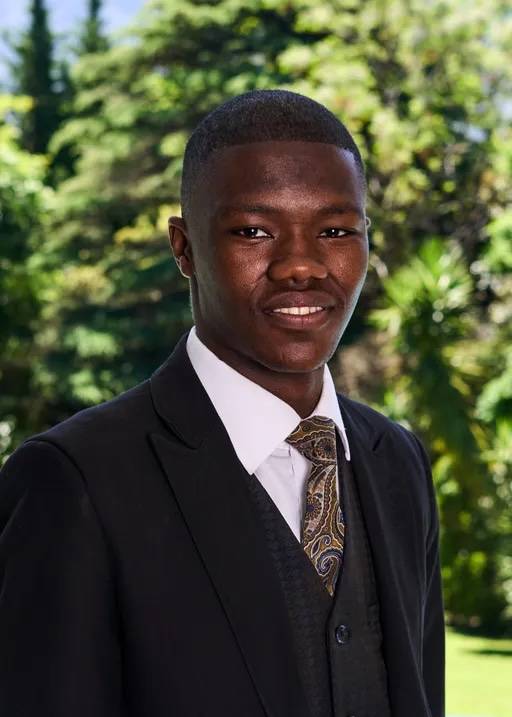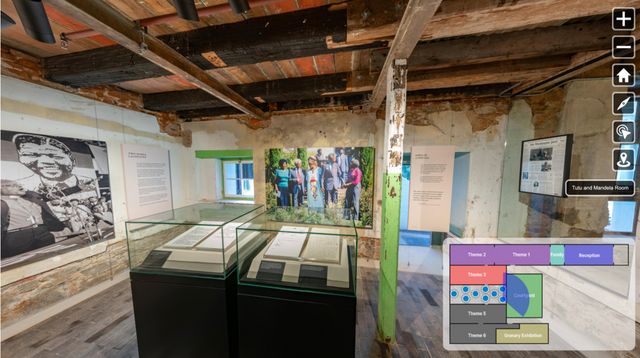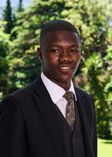
Scholar Stories
A haunting Reconciliation beyond the New dawn of Democracy: Lessons from an MRF Scholar
The air in Cape Town hung heavy with history, a deep weight I carried with me as I entered the Desmond & Leah Tutu Foundation Exhibition. As part of the Mandela-Rhodes Foundation Midyear Retreat, themed "Reconciliation and Reparations," this was more than just a tour; it was a pilgrimage into the soul of a nation. But nothing, absolutely nothing, could have prepared me for the chilling reality of walking through the former prison building.
Echoes in the Walls
A shiver, primal and profound, snaked down my spine the moment I stepped inside. The cold, unyielding stone seemed to whisper tales of unimaginable suffering. My heightened spiritual self, usually a quiet observer, was suddenly hyper-aware, straining to decipher the echoes trapped across time within those walls. The common saying, ‘walls have ears,’ took on a terrifying new meaning. I could almost physically hear them – the screams of anguish, the guttural cries of despair, the silent sighs of men and women robbed of their dignity and freedom. Each room we toured, each narrow cell, resonated with the ghosts of a brutal past, a horrifying symphony of pain that refused to be silenced. It was not merely a collection of artifacts, it was a living, breathing testament to atrocious genocides committed against black people, a visceral reminder that the past is never truly past.
The Longest Day: A ‘New Dawn’ Reconsidered
Amidst the harrowing narratives and somber exhibits, one room stood out: The Tutu and Mandela room, drawing me in with an almost magnetic pull. It was bathed in a different kind of light, not of despair, but of a hesitant hope. And there, on a prominent wall, was a centre piece image captioned "Dawn of a New Day."

It depicted the historic meeting in Bishop Desmond Tutu's garden, featuring Nelson Mandela, Albertina Sisulu, Tutu himself, Winnie Mandela, and Walter Sisulu. This photograph, symbolized the release of Nelson Mandela, a moment of profound significance, a turning point in South African history. It was presented as the dawn of a new era, a testament to the power of forgiveness and the promise of a reconciled nation.
But as I stood before it, my mind wrestled with the weight of that "new day." Was it truly a new dawn, or merely the longest day we have been living in ever since? Yes, it presaged the birth of a ‘New Democracy,’ a term so often uttered with reverence. Yet, for me, this ‘new day’ also represents a ‘lost revolution,’ a ‘lost generation,’ a ‘lost opportunity’ for true freedom. The euphoria of liberation, while undeniably monumental, seems to have been accompanied by a profound failure, of which the repercussions we live with to this very day.
This realisation breeds a peculiar form of disgruntlement, one which post this retreat I now understand is a beautiful, albeit challenging, canvas upon which leaders of Africa must paint. We, as a continent, share a history deeply intertwined with colonialism, oppression, and the subsequent struggles for liberation. The promises of independence and democracy, while aspirational, have often fallen short of true equity and justice. This shared history demands that all of us – from Cape to Cairo, from Lagos to Nairobi – collectively rethink what reconciliation and reparations truly mean for us. It's not just about a national truth and reconciliation commission, but about a daily, lived commitment within our homes, our communities, our countries, and as a united continent.
The Unspoken Truths: A Commercialized History
There is one stinging injustice of it all, particularly evident in the curated narratives within the museum itself. Our school history curriculums, do a monumental disservice to the original stories, the raw, unfiltered experiences of those who suffered and fought. Instead, these powerful narratives are now largely trapped and, ironically, commercialized in museums and exhibitions like this one. They present a romanticized, decorated, and revenue-attached history that, while necessary for remembrance, often glosses over the brutal realities and the hundreds of thousands of lives lost, utterly devastated by the Apartheid past. The exhibition and museums, while powerful, present a somewhat sanitized version of a horror story, palatable for public consumption, yet lacking the gritty, uncomfortable truths that should ignite a fire for true change. It’s a paradox: preserving history while simultaneously diluting its most painful lessons for mass appeal. The screams I heard in the prison walls are not fully echoed in the pristine exhibits, and that is a travesty.
A Call to Reflection and Duty
The journey through the exhibition, and the subsequent reflections, have been profoundly unsettling yet undeniably necessary. This experience, as part of the Mandela-Rhodes Foundation Midyear Retreat, serves as a potent reminder of the remarkable and often controversial work undertaken by organizations like the Mandela Rhodes Foundation and Desmond & Leah Tutu Foundation. They brave the storm of holding up names and legacies that are, simultaneously, heroes to some and enemies to others, navigating the complex tapestry of human experience and historical perception. This willingness to confront uncomfortable truths, to engage with the ambiguities of the past, is precisely what is needed in leadership today.
To all MRF Scholars, young leaders, and indeed to our esteemed older leaders, this is a call to reflection and a solemn call to duty. We stand on the shoulders of giants, but we also inherit the burden of their unfinished work. The ‘new dawn’ that emerged with Mandela’s release is still struggling to fully break through the clouds of injustice and inequality. It is our collective responsibility to ensure that the sacrifices of the past are not rendered meaningless by complacency or a romanticized view of history.
We must delve deeper into the true meaning of reconciliation, moving beyond superficial gestures to genuine healing and restorative justice. We must confront the thorny issue of reparations, not just as a financial transaction, but as a holistic commitment to correcting historical wrongs and building truly equitable societies. This requires courage, empathy, and an unwavering commitment to truth, even when it is uncomfortable. The screams in those prison walls, the unfulfilled promise of that "new dawn," and the disgruntlement that stirs within me are not just personal feelings; they are a collective conscience, urging us to complete the revolution that was lost, to truly usher in the dawn of a new, truly liberated, and equitable day for all.







